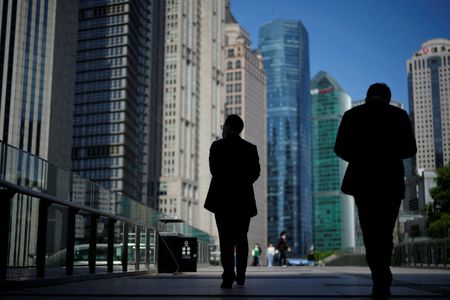By Kevin Yao
BEIJING (Reuters) -China will focus on stabilising its $17-trillion economy in 2023 and step up policy adjustments to ensure key targets are hit, said a statement following an agenda-setting meeting, as Beijing scrambles to cushion the impact of a surge in COVID infections.
The closed-door two-day meeting of top leaders and policymakers to chart the economy’s course in 2023 has been watched closely by investors amid expectations that Beijing would ramp up support measures.
The world’s second-largest economy faces multiple headwinds. COVID infections are surging following an abrupt relaxation of harsh restrictions, hitting businesses and consumers, while a weakening global economy hurts Chinese exports.
“The messages from the conference on monetary and fiscal policies do not suggest massive stimulus,” said Zhiwei Zhang, chief economist at Pinpoint Asset Management.
China will implement a proactive fiscal policy and a prudent monetary policy next year, said the statement, issued after the annual Central Economic Work Conference and published by the official Xinhua news agency.
Fiscal policy will be stepped up and become more efficient, maintaining the necessary intensity of spending, while monetary policy will be precise and forceful, keeping liquidity reasonably ample, the statement said.
“Next year, we will prioritise stability and strive for progress,” the statement said.
China should better coordinate epidemic prevention and control, and economic and social development, it added.
Policymakers have moved to address two of the key drags on the economy, the zero-COVID policy and a property sector downturn, but analysts believe it will be a while before these efforts bear fruit.
China’s move last week to start aligning with a world that has largely opened up to live with the virus followed historic protests against President Xi Jinping’s signature ‘zero-COVID’ policies.
While the U-turn will bring long-term benefits, surging infections are weighing on a fragile healthcare system.
China’s economy grew just 3% in the first three quarters of this year and is expected to stay around that rate for the full year, well below the official target of around 5.5%.
DOWNWARD PRESSURES
China will take steps to expand domestic demand, prioritise consumption recovery, and achieve major economic targets in 2023, the statement said, adding that the economy faces pressure from shrinking demand, supply shocks and weakening expectations.
“The most important takeaway from the conference is that boosting consumption is the top priority for the government in 2023. This strategy makes sense as consumption is currently growing much slower than it did before the pandemic,” Pinpoint’s Zhang said.
Government advisers told Reuters last month they would recommend the conference adopt 2023 growth targets ranging from 4.5% to 5.5%, while a central bank adviser said last month that China should set a target no lower than 5%.
Since then, proposals that China should aim for growth around 5% have gained steam in the run-up to the meeting.
Although key economic targets are expected to be endorsed at the meeting, they will not be announced publicly until China’s annual parliament meeting, usually held in March.
Top leaders reiterated that China will stick to its principle of “homes are for living in, not for speculation”, and pledged to support strong housing demand, the statement said.
(Reporting by Beijing newsroom; Editing by Edmund Klamann, John Stonestreet and Chizu Nomiyama)

